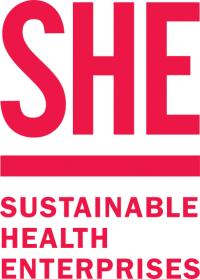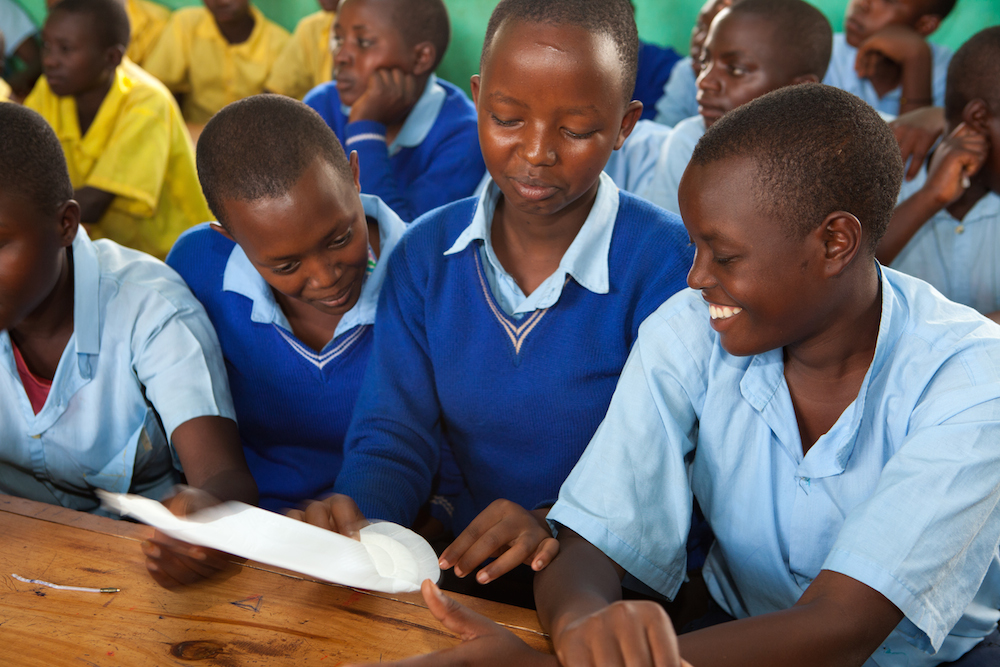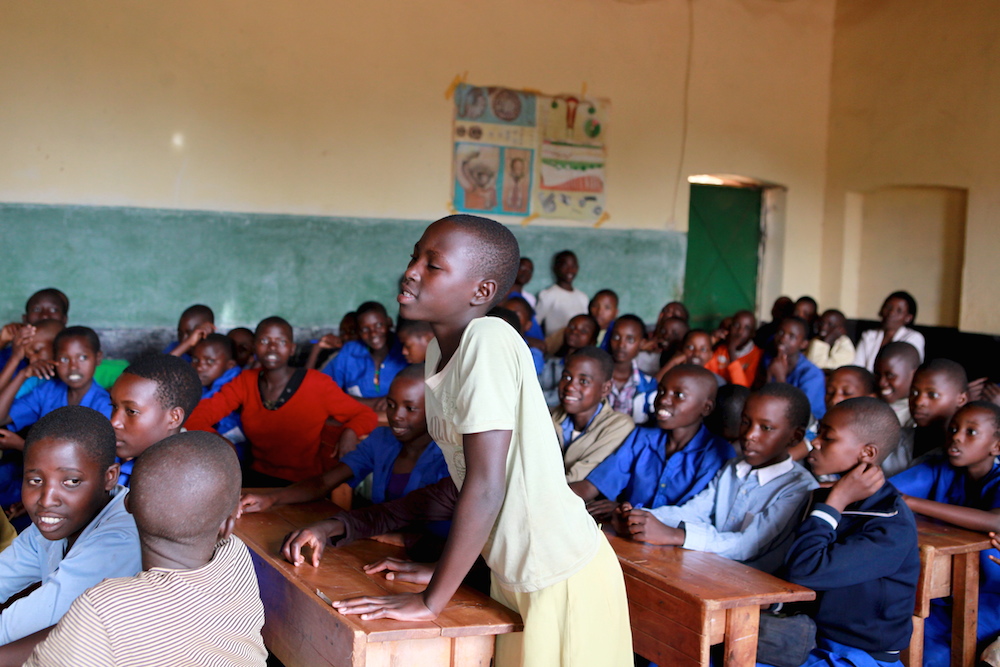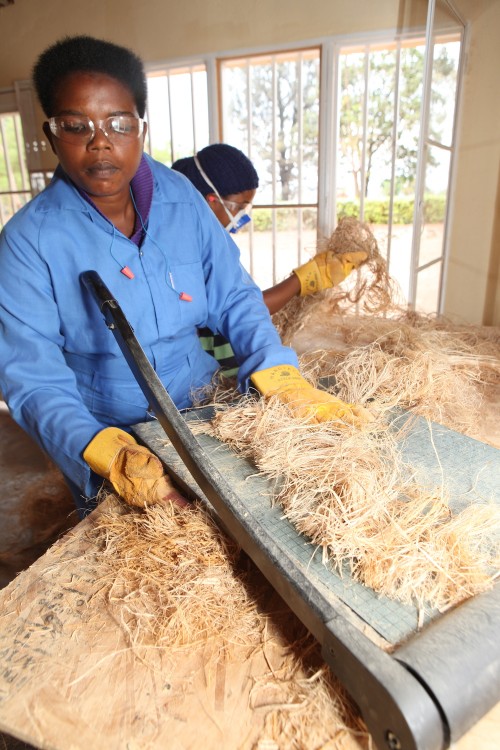
Mission
 Sustainable Health Enterprises’ (SHE) mission is to invest in people and ideas that are typically overlooked (and often taboo) to drive social and economic change. Its first initiative, SHE28, is addressing girls’ and women’s lack of access to affordable menstrual pads, causing significant costs to their health, education, productivity and dignity. SHE stems these costs with a franchise model that manufactures and distributes affordable, eco-friendly menstrual pads by sourcing local, inexpensive raw materials (banana fibers) and leveraging existing networks. Coupling these new businesses with puberty education and menstrual hygiene education and advocacy will have a significant and sustainable social and economic impact on communities served.
Sustainable Health Enterprises’ (SHE) mission is to invest in people and ideas that are typically overlooked (and often taboo) to drive social and economic change. Its first initiative, SHE28, is addressing girls’ and women’s lack of access to affordable menstrual pads, causing significant costs to their health, education, productivity and dignity. SHE stems these costs with a franchise model that manufactures and distributes affordable, eco-friendly menstrual pads by sourcing local, inexpensive raw materials (banana fibers) and leveraging existing networks. Coupling these new businesses with puberty education and menstrual hygiene education and advocacy will have a significant and sustainable social and economic impact on communities served.
Life Challenges of the Women Served
Adolescent schoolgirls in Rwanda and across Africa who live in rural areas and low-income urban fringe areas have little access to knowledge about reproductive health, hygiene and little access to affordable hygienic pads. When they reach puberty and begin menstruating around age 10 or 11, they are unprepared.
The cost of hygienic pads is out of reach for most rural and low-income girls. In Rwanda, a pack of sanitary pads costs the equivalent of 87 cents in the US, roughly a day’s wage for many women. Anecdotal evidence suggests that some girls turn to prostitution to get money for pads so they can attend school “comfortably” during menstruation. These activities expose them to sexually transmitted diseases.
In Rwanda, 18 percent of girls and women missed out on school and work last year because they could not afford to buy menstrual pads. Apart from the personal injustice and the larger issues of health and dignity, these absences are a potential GDP loss of $215 per women every year – a total of $115 million in Rwanda. It is estimated that 10 percent of African school-age girls do not attend school during menstruation. Missing four days every month is a significant loss in educational time.
Girls commonly associate shame with menstruation, which is distracting during school. Lack of an effective product makes girls feel uncomfortable, and the lack of private bathroom space where they can change and dispose of pads keeps some girls away from school.
Almost half of adolescent girls are totally ignorant about menstruation before its onset, while others have false information about it. Once menstruation arrives, girls perceive their period as a form of sickness that interrupts normal life. Mothers advise their daughters to remain separate from boys during menstruation instead of providing education on menstrual hygiene management, which results in girls being uninformed about how to have proper menstrual hygiene.
Menstrual taboos are so deeply rooted in Rwandan culture that they can often restrict girls’ social and economic mobility and access to menstrual health and hygiene information. Girls often cope by restricting their own physical mobility, concealing their bodies, or using common traditional materials such as animal skins and dung or mud and leaves. These are free and available, but they are unhealthy, ineffective, and uncomfortable.
The Project

The program couples the production and distribution of eco-friendly, affordable pads with puberty education and Menstrual Hygiene Management (MHM) through training of teachers to deliver the training in after-schools classes and advocacy to girls and boys. SHE will manufacture and distribute 180,000 eco-friendly affordable go! Pads to 10 schools to increase access to pads for 3,000 girls. They will also provide MHM skill-based training for 50 teachers in the Kayonza district of Rwanda as well as education resources. From these 10 schools, a total of 50 teachers will be trained in puberty education. To help break the taboo about openly discussing menstruation, girls, boys, parents and teachers will receive MHM educational resource materials.
The program addresses the following Millenium Development Goals:
- #3 Promote Gender Equality and Empower Women;
- # 5 Improving Maternal Health
- # 8 Global Partnership for Development
Questions for Discussion
- How do you think the holistic approach of SHE28 addresses education and empowerment of both girls and women?
- How do you think the SHE model of empowerment through access and education compares with the standard charitable model of donation of sanitary pads?
- Why do you think the education of parents, teachers and boys advances the success and effectiveness of the SHE28 MHM program?
How the Grant Will be Used
DFW’s grant of $44,947 over one year will reach 3,000 girl students and 50 teachers directly. The grant will be used to support the SHE28 campaign for puberty education and MHM teacher training program, and a portion of pad production costs such as raw materials and distribution costs.
The grant will support:
- Manufacture and distribution of 180,000 eco-friendly pads for 3,000 Rwandan girls attending 10 schools to provide employment for local women and income to banana fiber cooperatives
- Direct training of 50 teachers in MHM and teaching the MHM curriculum for delivery of after-school health club program modules with this content to girls and boys
- Creation and dissemination of an updated puberty education and MHM resource booklet for teachers, students and parents in collaboration with teachers and students
- Personnel and administrative costs to cover the salary for the Health and Hygiene Manager, stipends for interns and the travel costs for teacher/school technical assistance and monitoring and evaluation visits for MHM after school implementation
Download the budget for more details. (NB: This is an Excel spreadsheet. If it does not open in your browser, you will need to download it to your desktop and open it through the Excel application.)
Why We Love This Project/Organization
SHE has an innovative solution to dealing with the systemic problem of affordable menstrual products in Rwanda. SHE’s go! pad, developed with the assistance of its partners from a patent-pending mechanical process, uses locally available banana fiber which is affordable, eco-friendly and provides jobs from the farmer to the pad assembler. The focus of SHE’s education campaign is on providing education to both boys and girls and to parents about puberty and menstrual hygiene. SHE aims to break the silence around menstrual taboos in schools. SHE’s advocacy efforts influence Rwandan government policy to affect positive inclusion of MHM into strategic plans and remove taxes from pad sales to reduce costs to the consumer.
Evidence of Success
- SHE has jump-started 50 micro-entrepreneurs by training community health workers in menstrual hygiene education and equipping them with sales management skills for the sale of pad products. The workers were able to sell the pads at a lower price while earning 10 percent commission and providing access to more affordable menstrual pads (15 – 65 percent lower than other available brands).
- SHE’s first advocacy campaign, “Breaking the Silence,” brought the taboo of menstruation to national attention, and as a result, the Rwandan government included in the 2010 budget a new sanitation line item of $35,000 (USD) to procure pads for schools.
- In 2012, SHE signed up two banana cooperatives, the majority of whose employees are women, to supply SHE with raw banana fiber material for pad production.
- In 2013, with community partners, SHE conducted menstrual hygiene awareness campaigns with eight schools reaching 996 students and 85 youth at a youth center.
- To date, SHE has reached 200 students celebrating the first Global Menstrual Hygiene Day.
Voices of the Girls

“I can’t go to school when I don’t have pads. This causes me to miss school, which is something important to my future.” – Penina, a student at Duha School
“It’s a problem when you live with your father. You fear to ask him pads. When you menstruate for the first time – and no one have ever told you about menstruation – it’s a disaster. You are scared and don’t know how to handle the situation. You feel humiliated and ashamed. But when you know about menstruation, and you have an accident, you can easily manage your periods in secret.” – Nyagato
“What makes me proud today is that I work in a factory because I heard that no women can work in a factory and I’m glad that I made it.” – Mukandutiye Sandrine, SHE Rwanda, Production staff member
About the Organization
Elizabeth Scharpf founded SHE in 2009. As a Harvard graduate student interning for the World Bank in Mozambique, she learned that 20 percent of factory workers missed work regularly, up to 30 days a year, because of menstruation and the lack of access to affordable pads. Pads cost more than a day’s wage for many of these women. Scharpf conducted further research and contacted people she knew in pharmaceuticals and biotech industries to learn about the taboos associated with menstruation.
As a result of research and testing results, SHE began using locally available banana leaf fiber to produce effective but low cost, biodegradable sanitary pads. In 2013, SHE built a production facility in Ngoma District. Here, a collective of women have purchased machines to process banana fiber into fluff that is manufactured into eco-friendly sanitary pads at about a third of the cost of ordinary pads. The women can sell pads to their friends to earn a small income and ensure that they and their daughters have pads so they do not miss work during their cycles.
SHE operates on the principle that charity in the form of money or donated sanitary pads isn’t enough to break the cycle of menstrual discrimination and its effects on the lives of girls and women. Instead, SHE seeks to actively partner with potential entrepreneurs within emerging markets to create jobs and accelerate the path toward sustainable social and economic change.
SHE also advocates for MHM and women at the government level by bringing on Rwandan and global leaders to influence lawmakers to waive the value-added taxes on sanitary pads. In 2013, the East African Legislative Assembly passed a resolution urging partner states to waive taxes on sanitary pads in the region to increase their availability and affordability for young girls. In Rwanda, SHE has urged the government to lift the 18 percent value-added tax on feminine hygiene products. Currently, the government allocates about $440 to each secondary school every term for sanitation, which includes the purchase of sanitary pads for students.
Where They Work
Kyonza district, where the SHE28 program is centered, is located in the Eastern Province of Rwanda, which borders on Tanzania and is located about two hours east of Kigali, the capital of Rwanda. Kyonza, the small village for which the province is named, sits on the main road from Kigali at the junction where the road turns north to Uganda or south to Tanzania. Because of its location at this junction, it serves as a major trucking and transportation hub for the district. It is also a hub for women’s empowerment. Kyonza is where Women for Women International chose to build their Women’s Opportunity Center, an educational and community center to help female survivors of war start businesses to support themselves and their family.
Rwanda
Located in East Africa, Rwanda is a densely-populated, landlocked, developing country. Rwanda is still recovering from the 1994 civil war and genocide and an AIDs epidemic that began in the 1990s. Economic activity and tourism are on the rise in Rwanda according to the UN. Hotels and guesthouses are numerous in Kigali, the capital, and in major towns, but are limited in rural areas.
Rwanda is a country of only 28,338 square kilometers but with a population of over 10 million. Because of the deaths of so many men in the genocide, women make up more than half (51.8 percent) of the population. Its population density of over 300 people per square kilometer. is the highest in Africa. The fertility rate is high and the population has been increasing at an annual rate of about 2.8 percent. The population growth strains development, equitable distribution of resources and agriculture, which is the mainstay of the economy of the country. Population control is therefore one of the government’s top priorities.
Gender issues in Rwanda are mixed. Maternal and child mortality is decreasing, but there is still far to go. Women, however, hold a large percent of senior level jobs in many sectors including business, government and education. Education opportunities for girls and women are good in much of Rwanda, but in poor rural areas, women still face challenges in accessing education.
Almost half (44.9 percent) of the population lives below the poverty line. Most of the poor are rural farmers. Sixty percent of Rwandans live in rural areas. Ninety percent of the labor force works in agriculture, but only 31.9 percent of the GDP is from that sector.
The country is striving to rebuild its economy, with coffee and tea production being among its main sources of foreign exchange. It is expected that if the country continues with its reforms and market economy approach, the future for development looks good.
Source Materials
UN Data – Rwanda Country Profile
Rwanda Country Profile – US Dept of State
